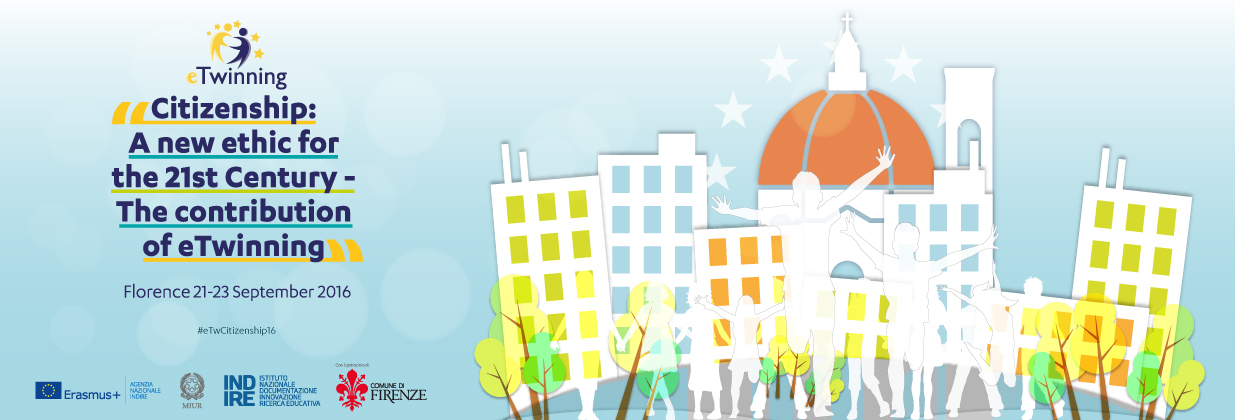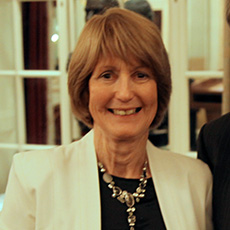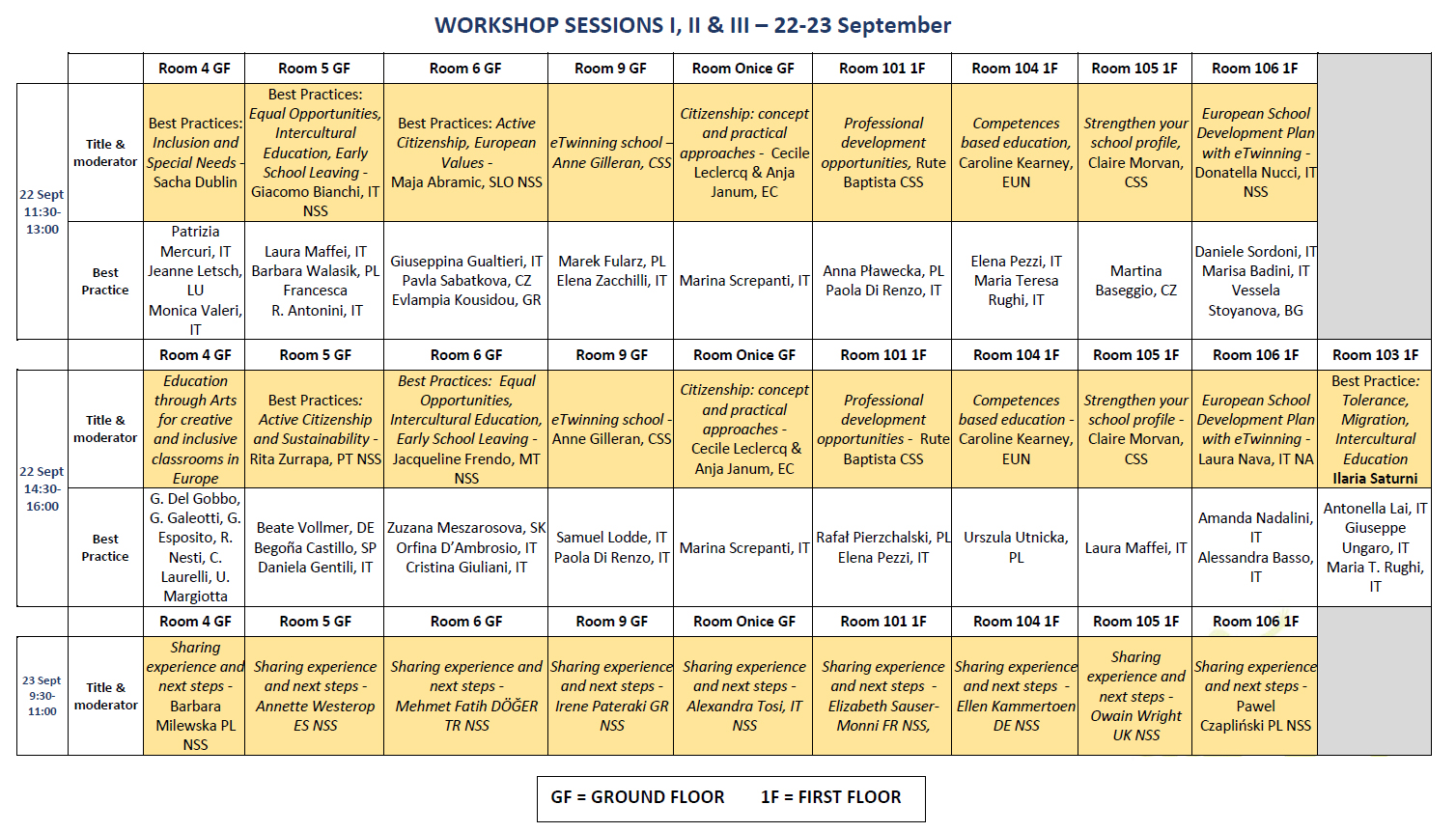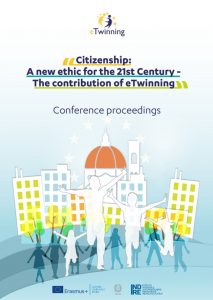Home » Sessions and materials
Sessions and materials

About |
Programme |
Sessions and materials |
Venues and practical info |
Sessions and materials
CONFERENCE PROCEEDINGS
Download the proceedings book of the event (click here to download: EN version – ITA version).
STREAMING (Day 1, plenary)
INTERVIEWS
PRESENTATIONS (click on the links to download the pdf, when available)
KEYNOTE SPEAKER
21 September 17:00 – Salone dei Cinquecento, Palazzo Vecchio, Florence
Preventing Violent Extremism: Global Citizenship Education Plus
Lynn Davies – Emeritus Professor of International Education, University of Birmingham
Violent extremism has global reach but needs localised solutions. This paper argues that for initiatives in preventing violent extremism, the global citizenship education agenda has potential, but needs a sharper edge. I look first at the nature of extremist mindsets, with their narrowing of focus, preference for black and white binary truths and lack of complex structures of thinking.
The question becomes how to retain or restore complexity and take people out of their comfort zones. This tactic has three interwoven strands: value pluralism, contact with ‘strangers’ and taking action, that is, thinking, meeting and experimenting. Value pluralism and integrative complexity are tackled in depth in this conference. I outline some of the different projects we have been involved in on strengthening the voice and confidence of young people through contact with ‘others’, learning debating and campaigning skills and sharing their stories. I also look at twinning initiatives outside Europe. But underpinning all strategies has to be the bedrock of human rights and children’s rights. This enables judgements to be made on what to respect and what to disrespect, and is more hardhitting than GCE’s vague promotion of ‘respect for diversity’.
I extend the GCE core themes of knowledge, values, skills and actions to include: knowledge and understanding of extremism and protagonists; comfort with ambiguity of values whilst being able to make rights-based judgements on controversial issues; skills in communication and persuasion whilst being resilient to extremist messaging; and capacities to seek social change through collaborative, non-violent means. It is less a new ethic for citizenship education and more a new zone: for students and teachers it opens up the ‘safe’ spaces to sometimes uncertain learning outcomes. But resilience comes from risk.
6 PARALLEL THEMATIC FOCUS
22 September 9:30-11:00 – Registration online before arrival in Florence
 1- The Challenge of Cultural Diversity and Approaches to Integration, Anna Triandafyllidou, European University Institute
1- The Challenge of Cultural Diversity and Approaches to Integration, Anna Triandafyllidou, European University Institute
This seminar seeks to clarify the terms commonly used to talk about identity and diversity as well as to discuss the phenomena that underpin a fear of diversity. It also discusses possible answers to the challenges that ethnic and religious diversity bring in everyday life and specifically in schools, using examples taken from the Handbook on Tolerance and Cultural Diversity in Europe.
 2- Three strategies for improving school inclusion, Dario Ianes, Free University of Bolzano.
2- Three strategies for improving school inclusion, Dario Ianes, Free University of Bolzano.
The speech will be about three main strategies from Italian experience:
- Individualized Educational Plan (IEP) and Personalized Didactic Plan (PDP) founded on the approaches of Equity instead of Equality, WHO`s International Classification of Functioning model and Compensation;
- Inclusive didactic strategies based on Universal Design for Learning philosophy
- Whole school inclusive self-developmental approach.
 3 – Citizenship Education at School: What We Have Learnt from the IEA International Civic and Citizenship Education Study (ICCS 2009), Bruno Losito, University of Roma Tre
3 – Citizenship Education at School: What We Have Learnt from the IEA International Civic and Citizenship Education Study (ICCS 2009), Bruno Losito, University of Roma Tre
ICCS 2009 is the third international comparative study organized by the International Association for the Evaluation of Educational Achievement (IEA). The large-scale assessment took place in 2009. Thirty-eight countries from Europe, Asia and Latino America participated in the study.
The study investigated how grade 8 students of the participating countries are prepared to play their role of active and responsible citizens and what are the curricular approaches as well as the teaching strategies and procedures adopted at school level.
 4 – Moving from polarised ‘black and white’ thinking to collaboration despite disagreement: The empirically validated approach of IC Thinking, Eolene Boyd-MacMillan, Senior Research Associate and Co-Director, IC Thinking Group, Department of Psychology, University of Cambridge IC Thinking Cambridge
4 – Moving from polarised ‘black and white’ thinking to collaboration despite disagreement: The empirically validated approach of IC Thinking, Eolene Boyd-MacMillan, Senior Research Associate and Co-Director, IC Thinking Group, Department of Psychology, University of Cambridge IC Thinking Cambridge
All people live in a web of relationships that includes those with whom we disagree. Global citizenship and the values of tolerance, non-discrimination, and respect require us to live and work with those with whom we disagree. Yet most of us struggle to do this at all, let alone well. The IC Thinking Research Group has developed an educational approach from which participants emerge equipped to respect and work pro-socially with difference and disagreement. Our empirical measures with predictive results validate our method and show that people can change.
 5 – Fostering civic cultures in digital societies through critical media literacy, Maria Ranieri, University of Florence
5 – Fostering civic cultures in digital societies through critical media literacy, Maria Ranieri, University of Florence
Over the last 15 years, European countries have witnessed a growing number of hate crimes towards immigrants and minorities. Discriminatory discourses are echoed online, since far-right populist organisations and movements began using the Internet and social media platform to spread othering rethoric. From an educational point of view, concerns have emerged about the impact of hate messages on young people, and the role that media may play in reinforcing stereotyped representations of the ‘other’. At the same time media are seen as means to convey discriminatory messages (Livingstone et al., 2013) as well as enabling platforms for alternative political practices (Mihailidis, 2011). In this context, critical media literacy combined with civic education can be viewed as a potential strategy to develop civic cultures by raising young people’s awareness of (anti-)discrimination and enabling them to participate as active citizens in contemporary digital societies. I try to highlight this potential through the presentation of educational contents developed and tested over the period 2013-14 in seven European countries (Austria, Belgium, Bulgaria, France, Italy, Slovenia and the United Kingdom) with the financial support of the European Commission (Daphne Program, e-Engagement against Violence Project).
 6 – Addressing discrimination and racism in Schools, Udo Enwereuzor, COSPE
6 – Addressing discrimination and racism in Schools, Udo Enwereuzor, COSPE
We will explore some of the key concepts underlying discrimination in general and racism in particular and try to identify the specific characteristics and dynamics of discriminatory practices as they may occur in the schools between various actors involved. It will seek to go beyond ‘non-discrimination’ in favor of affirming a positive duty not to discriminate on the part of School authorities. Prospective participants are invited to bring along any examples of good practices they may have on handling racist and/or discriminatory incidents amongst students or colleagues.
WORKSHOPS
Registration in site (in case a workshop should not reach a minimum required number of participants, it may be cancelled).

Parallel Workshop Sessions I & II – September 22 (11:30-13:00, 14:30-16:00)
All workshops will be repeated in session I and II, except for the workshop “Education through Arts for creative, inclusive classrooms in Europe” (only session I).
1. Best Practices on Citizenship, Headmasters, teachers and experts from all over Europe, moderators
Best practice showcase on different aspects of citizenship taken from eTwinning and Erasmus Plus projects and other inspiring experiences related to the themes of the Conference.
- Beate Vollmer, teacher in Albert-Schweitzer-Geschwister-Scholl-Gymnasium, Marl, Germany
- Barbara Walasik, teacher in IX Liceum Ogolnóksztalcace im. C. K. Norwida w Częstochowie, Poland
- Laura Maffei, teacher in Scuola Secondaria Statale di I Grado Arnolfo di Cambio, Colle di Val d’Elsa, Italy
- Giusi Gualtieri, teacher in Liceo Scientifico Guglielmo Marconi, Foligno, Italy
- Jeanne Letsch, inspecteur – Bureau régional Est, Grevenmacher, Luxembourg
- Evlampia Kousidou, teacher in 5th General Lyceum of Thessaloniki, Greece
- Maria Teresa Rughi, teacher in Istituto di Istruzione Superiore Giuseppe Mazzatinti, Gubbio, Italy
- Daniela Gentili, teacher in Liceo statale G. Bagatta, Desenzano del Garda, Italy
- Begoña Castillo, teacher in I.E.S. Jose Luis Castillo Puche, Yecla, Spain
- Pavla Sabatkova, eTwinning Czech National Support Service
- Zuzana Meszarosova, teacher in Obchodná akadémia, Levice, Slovakia
- Cristina Giuliani, teacher in Istituto Comprensivo F.lli Casetti, Crevoladossola, Italy
- Patrizia Mercuri, headmaster in Istituto Comprensivo San Donato, Sassari, Italy
- Antonella Lai, teacher in I.I.S.S. Charles Darwin, Roma, Italy
- Giuseppe Ungaro, headmaster in Liceo Scientifico Galileo Galilei, Bitonto, Italy
- Monica Valeri, teacher in Istituto Comprensivo Pietro Egidi, Viterbo, Italy
- Orfina D’Ambrosio, teacher in Liceo Scientifico Salvatore Di Giacomo, San Sebastiano al Vesuvio, Italy
- Francesca Romana Antonini, teacher in ICS 3 A.Vivenza-Giovanni XXIII di Avezzano, Italy
2. eTwinning school, Anne Gilleran, Senior Advisor, eTwinning Central Support Service
The focus of eTwinning up to now has been on the work of the individual teacher. However, to tackle the emergent issues in education requires a concerted approach led and driven by school management. The introduction of the title eTwinning School is to give recognition to those school principals and management who actively support, encourage and develop eTwinning activities within their school. This workshop will introduce the process of becoming a designated eTwinning School
Some testimonials will help participants to contextualize the theme and get inspired: Headmaster Elena Zacchilli, Liceo Machiavelli, Rome, Italy; Headmaster Marek Fularz, Szkoła Podstawowa nr 1 w Bogatyni, Poland; Headmaster Paola Di Renzo, Istituto Comprensivo 3, Chieti, Italy; Headmaster Samuel Lodde, College Paul Bert Fécamp, France.
3. Professional development opportunities, Rute Baptista, Pedagogical Officer, eTwinning Central Support Service
Professional Development is one of the four cornerstones of the success of eTwinning. In this workshop, we will explain the various types of professional development opportunities available and hear how involvement has led to greater collaboration in project work. Some examples will help participants to contextualize the theme and get inspired.
- Rafał Pierzchalski, Headmaster Gimnazjum nr 4 z Oddziałami Dwujęzycznymi im. Z. Wilkońskiego w Inoworocałwiu, Poland
- Anna Pławecka, teacher in II Liceum Ogólnokształcące im. Czesława Miłosza w Jaworznie, Poland
- Elena Pezzi, Italian Ambassador, Liceo Statale Linguistico e delle Scienze Umane “L. Bassi”, Bologna, Italy
- Paola Di Renzo, Headmaster Istituto Comprensivo 3, Chieti, Italy
4. European School Development Plan with eTwinning, Donatella Nucci, Italian National Support Service & Daniele Sordoni, Headmaster; Laura Nava, Italian Erasmus Plus National Agency
How to exploit all opportunities offered by Erasmus Plus and eTwinning to strengthen the European dimension of the school and develop the quality of its educational offer, through collaboration at European level and in service teacher training. Some examples will help.
- Vessela Stoyanova, Headmaster of the School „Dimitar Talev”, Dobrich, Bulgaria
- Marisa Badini, teacher Ottavo circolo didattico Piacenza, Italy
- Daniele Sordoni, Headmaster Istituto Tecnico Corinaldesi, Senigallia, Italy
- Alessandra Basso, teacher in Istituto Comprensivo Villaputzu, Villaputzu, Italy
- Amanda Nadalini, teacher in I.I.S. Giosuè Carducci, Ferrara, Italy
5. Competences based education, Caroline Kearney, Senior Education Manager and Analyst, European Schoolnet
Traditional learning methods have been enhanced by some newer concepts in the past few years such as the Key Competency framework developed by the European Commission. These competencies are viewed within a context of 21st Century learning with direct links to further education and employability. This workshop will examine how the development of the competencies of both teacher and pupils may be enhanced by working in eTwinning. Some examples will help participants to contextualize the theme and get inspired.
- Urszula Utnicka, eTwinning Ambassador, Gimnazjum w Krempachach, Poland
- Elena Pezzi, Italian Ambassador, Liceo Statale Linguistico e delle Scienze Umane “L. Bassi”, Bologna, Italy
- Maria Teresa Rughi, IIS “G. Mazzatinti” – Liceo Classico, Gubbio, Italy
6. Strengthen your school profile, Claire Morvan, Communication Manager, eTwinning Central Support Service
This workshop will explore how to best exploit eTwinning project results to increase school’s influence and strengthen its identity at both national and European level. Some examples will help participants to contextualize the theme and get inspired.
- Laura Maffei, eTwinning Ambassador, Scuola Secondaria di I grado A. Di Cambio, Colle di Val d’Elsa, Italy
- Martina Baseggio, eTwinning Ambassador, Gymnázium Hladnov a Jazyková škola s právem státní jazykové zkoušky, Czech Republic
7. Citizenship: concept and practical approaches, Anja Janum and Cécile Le Clercq, European Commission
Citizenship means many things to many people. The workshop will explore our current understanding and approach of citizenship, in particular in relation to the Paris Declaration, and how its various components could be translated in tangible way for teachers and pupils in the context of School Education, and in particular eTwinning.
- Marina Screpanti, eTwinning ambassador, ICS 3, Chieti, Italy “Supercitizen’s Almanac” and “VOICE=Values Opinions and Ideas of Children in Europe”, eTwinning project
8. Education through Arts for creative and inclusive classrooms in Europe, Giovanna Del Gobbo, Glenda Galeotti, Gilda Esposito, Romina Nesti, University of Florence, SCIFOPSI, Cinzia Laurelli International Yehudi Menuhin Foundation , Umberto Margiotta, Fondazione Nazionale Carlo Collodi
Starting from the ongoing Erasmus KA3 project META (Minority Education Through Arts) we will share main lessons learnt in EU successful experiences of using arts in pre-primary and primary education (with a curious eye to other settings as well) for inclusion and invite participants to share their own. In an interactive workshop, we will stimulate cognitive, emotional and ecological intelligence of participants in order to imagine innovative and creative classrooms.
Parallel Workshop Session III – September 23 (9:30-11:00)
- Sharing experience and next steps, Working together – Round table discussions, moderators:
These workshops will challenge you to analyse some case study situations with your colleagues that are pertinent to the theme of the conference and find possible solutions through sharing and discussion in small groups. During this session, the discussion will also focus on where we go beyond this conference. What do you need in relation to the challenges of trying to foster active citizenship? What supports can we provide to you and your colleagues?
About |
Programme |
Sessions and materials |
Venues and practical info |



